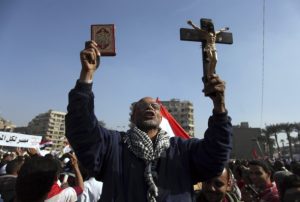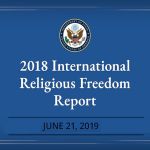By Maged Atiya – Salamamoussa –
 In a recent interview with the Coptic Canadian History Project, Dr Angie Heo, a scholar of Coptic culture, stated that she sees a special responsibility for diaspora Copts, as
In a recent interview with the Coptic Canadian History Project, Dr Angie Heo, a scholar of Coptic culture, stated that she sees a special responsibility for diaspora Copts, as
“In light of these [persecution of Copts] horrific realities, however, I believe it is all the more important to ensure the diagnosis for these problems is not reactionary but carefully accurate. Coptic scholars and scholars of Copts can help mitigate Islamophobia by directing attention away from the “essence” of Islam and toward the larger structures of violence and disenfranchisement that impact all minority communities, Christian and Muslim alike.“
In spite of the high-sounding but awkwardly constructed language, it is easy to detect a message that is increasingly common among some scholars of the Copts. Diaspora Copts, especially those in North American and Australia, have to censor their exposure of the increasingly tenuous conditions of Egyptian Copts lest such discourse be used by anti-Muslim bigots in the West. There is also a subtle threat in this warning. Any discussion of how Islam and its cultural content may contribute to systemic persecution of Eastern Christians is verboten. It may further endanger these same Eastern Christians while enabling anti-Muslim bigots. Copts, by virtue of being victims, are charged with a special responsibility to “mitigate” the reactions of the larger culture in which they exist and over which they have little control.
The statement also sets up a false equivalence. While there is a nasty strain of anti-Muslim prejudice among some Western Christians, the experience of Muslims in the West and Christians in the East are not “alike”. Nor are the ‘larger structures of violence and disenfranchisement “ the same. Christian mobs are not sacking mosques in the West on a weekly basis. The rise of ugly white supremacists has yet to result in legal strictures on the practice of any religion.
It is certainly true that there is a residue of anti-Muslim feelings among some recently immigrated Copts. This is an expression less of their religion than of their native culture. In the clash between the christian message of “love thy neighbor” and the knowledge that it was this very same neighbor that drove you out of your homeland, the lesser angels sometimes win. This must be combated on an on-going basis, not only for the good of Muslims but also for the cultural progress of the Copts. But that effort should in no way curtail the reasoned exposure of systemic religious persecution, nor should it dilute such exposure by making it overly general about “all structures of violence and disenfranchisement.” To insist that specific and often horrific violence should be addressed by an effort aimed at a larger reform of humanity is to allow the continuance of this violence by a quixotic, but ultimately insensitive, idealism.
The Coptic experience in Egypt is familiar to many oppressed groups. They are expected to mind their manners, toe the line, walk close to the wall, show deference, or whatever euphemism is available at hand. And indeed for the most part Copts have conformed to these habits of servitude. But in the gloriously noisy and free West, many no longer see any purpose in such displays of caution. They are entitled to their freedom, exuberance, and on occasions, regrettable mistakes. It is bad enough that the Coptic identity must be continuously downplayed in Egypt, to the detriment of every one in the country, be they Muslim or Copt. It need not be so in countries that glorify diversity and expressions of individual and group identity.
More specifically, diaspora Copts have every right to engage in a reasoned discussion of Islamic culture, one devoid of hate or systemic demonization. The conditions in Egypt can not be blamed on a generalized “cultural problems”. Religion plays a large and prominent role in the cultural life and governance of Egypt. We can not engage in any reasoned debate about the flaws in these social and political structures while tip-toeing around both religions in the country. When Christian thinkers, responding to the suffering of Jews and to their own moral imperatives, recognized the role their theology played in antisemitism they opened a pathway for all Christians to become better Christians. Vigorous discourse between Christian and Muslim theologians was the highlight of the ascendance of Islamic culture. The shutting down of such discourse was a hallmark of its decline. There is no greater service a Copt can render a fellow Muslim than a reasoned and respectful critique of his culture and religion. It is thus that we love our neighbor.
________________________
Of Copts and Islamophobia




